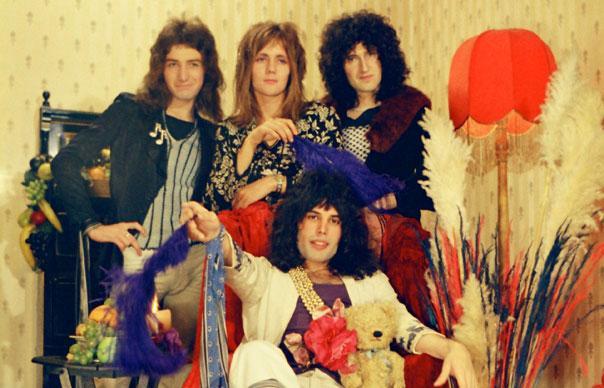Nine trucks carried the band’s gear between the cities of Córdoba, Rosario, Porto Alegro, Rio de Janeiro and São Paulo, and in Buenos Aires a police van whisked the band out of the stadium backstage area under decoy to protect them from hysterical fans.
Convoys of motorcycles and police sirens made for a spectacular exit of the band that would have passed for an encore for many a lesser group of musicians. The band’s four individual cars to which they switched a mile or so out of the stadium featured drivers amazed at such a fuss – until they arrived at their destination where the players were fêted like royalty.
“Well, I just don’t know about this any more,” mused the down-to-earth, self-deprecating drummer Roger Taylor over a celebration dinner that began at 2am. “Here I am, just a bloody rock’n’roll drummer and all these thousands of kids are going crackers. It doesn’t seem right, somehow, with Britain in a recession.”
At the dinner, Queen had invited as their guests the dozen or so special police who had protected them so well from the crowds – and at the end, as the champagne flowed, the police gave all four the City’s police badge as a memento.
A few more mind-boggling figures to persuade the sceptics that Queen meant business: it took 300,000 watts to power their elaborate stage lighting, which included a complete aircraft landing system. To buy this, they invested in six months of production at the American factory, where the manager asked: “How many planes do you guys want to land, anyway?”
At the Maracanã Stadium in Rio, the only previous non-sport gatherings had been held for the Pope and Frank Sinatra before Queen’s bash.
All this, then, was pomp and circumstance personified. Queen have never been a band to use one exclamation mark when a hundred or so will do. In South America, one of the world’s top bands who have mastered the art of transforming rock into theatre had their eye, from the start, on cornering a slice of history. Preening like peacocks, they won the hearts and souls of a totally new audience and, importantly, opened up a new chapter for rock acts prepared for a new enterprise. The global audience for rock had thus been expanded, both for record sales and concerts. Rock’s geography has just been changed.
The music may be at a directional standstill, or at best consolidation, but Queen deserve every plaudit in the book for risking their reputation by taking South America. They didn’t do it for money. With an entourage of 40 and all the equipment and travel costs, profit would have been hard to achieve. Their running costs were £25,000 a day, they said. They did it because, like a lot of bands, after eight years of winning, they needed a new challenge if their touring career was not to stagnate.
“We really were nervous,” said Freddie Mercury, smiling after the success of the first show. “We had no right to automatically expect the works from an alien territory. I don’t think they’d ever seen such an ambitious show, with this much lighting and effects.”
Modest Brian May, Queen’s inspired lead guitarist, added: “It’s a long time since we’ve felt such warmth from a new audience, although we couldn’t see much because of the size of the crowd. We feel really good about it now, as if our ambitions have been partly realised again.”
Both men were being unduly bashful. Queen’s rule of thumb has always been that, visually, nothing succeeds like excess. The theory worked perfectly on the excitable Argentinians and Brazilians, who went nuts after recovering from the exuberance of the Rio Carnival.
Queen’s over-the-topness has, of course, incurred the wrath of rock’s purists, minimalists and miseries who have been fashionable until recently. South America loved them, for a Queen show is an unashamed celebration, a spectacle blending a true sense of the absurd in blinding light effects, dry ice and explosives with Mercury’s calculated and measured histrionics.
Freddie insists he is not the leader, merely the focal point: certainly they mesh as a band and are excellent musicians writing light, easily remembered, thoughtfully constructed songs that lend themselves well to being acted out. Queen are also, unlike most other rock bands, in total charge of their own destiny. They have no overall manager to pull their strings, but several people work for them in clearly defined roles: business manager Jim Beach, who is credited with piecing together the daunting jigsaw of the South American tour; personal manager Paul Prenter; and a personal bodyguard for each musician.
Freddie, Brian, Roger and John meet most weeks like any other company board of directors to assess their operation, listen to advice, make decisions. Queen is a tightly run industry over which the four musicians have complete control – a rare situation in a rock industry littered with hundreds of casualties who sadly have no conception of making music a career. It was this cool logic and judicious planning that led them to that Buenos Aires soccer stadium stage, to capture a crown as the rock band that first gripped South America.
There was talk that other bands, notably the Stones, wanted the honour of “taking” this part of the world first. But Queen’s timing was perfect – they arrived in Buenos Aires to receive platinum albums and the news that “Another One Bites The Dust” was No 1 single in Argentina and “Love Of My Life” was still high in the São Paulo charts after a year in the best-sellers.
The scene was all set. The tour was actively approved and smoothed by Argentina’s new president, General Viola; posters littered the city proclaiming their arrival; and the band’s concerts were hot TV and radio news material. Bootleg tapes were being made by the thousands at their shows, for in this unsophisticated rock territory, there are few rules.



